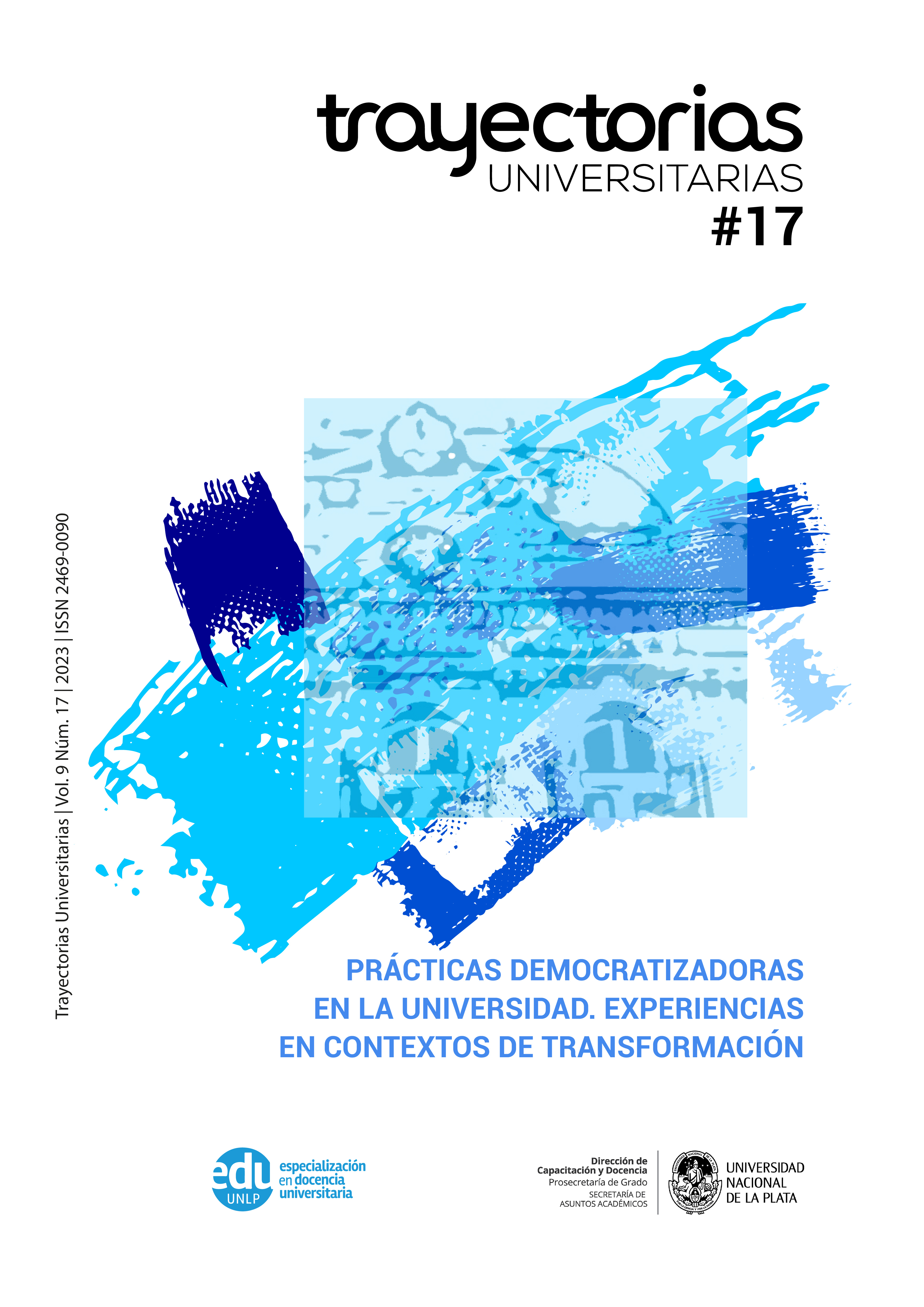Importance of generic skills in virtual educational contexts in the training of infant teachers
DOI:
https://doi.org/10.24215/24690090e144Keywords:
thesis work, generic competences, undergraduate training, teachers in Early Childhood Education, pandemicAbstract
The experience that arose in higher education from the sanitary restrictions applied by covid-19, allowed us to observe the effects of the forced incorporation of digital tools in the teaching-learning process, which revealed the skills required to deal with them. This article gives an account of a multiple case study carried out with fourth-year students of the Early Childhood Education career belonging to two Chilean universities, whose purpose was oriented to inquire about the competences that are put into practice during the guided thesis work. virtually during the course of the pandemic. The information collection procedures used were self-assessment questions, semi-structured interviews and focus groups applied to the study participants. The results show the relevance that the students give in a remote work context to time management, flexibility and empathy within the work group and the strategies used to deal with problems. These results allow us to discuss the role played by generic competencies in the training of future educators, in order to advance in strengthening them during undergraduate training.
Downloads
Metrics
References
Acosta, N. (2020). Formación de maestros en educación infantil: revisión de tendencias investigativas. Pedagogía y Saberes, (53), 83-96. https://doi.org/10.17227/pys.num53-10402
Almonacid-Fierro, A., Vargas-Vitoria, R., Mondaca, J. y Sepúlveda-Vallejos, S. (2021). Prácticas profesionales en tiempos de pandemia Covid-19: Desafíos para la formación inicial en profesorado de Educación Física. Retos, 42,162-171. https://doi.org/10.47197/retos.v42i0.87353
Cabero, J. y Valencia, R. (2021). Y el COVID-19 transformó al sistema educativo: reflexiones y experiencias por aprender. International Journal of Educational Research and Innovation (IJERI), (15), 218-228. https://doi.org/10.46661/ijeri.5246
Castillo-Retamal, F. (2021). Formación docente en TIC y su evidencia en tiempos de COVID-19. Revista Saberes Educativos (6), 144-168. https://doi.org/10.5354/2452-5014.2021.60715
Crespi, P. y García-Ramos, J. (2021). Competencias genéricas en la universidad. Evaluación de un programa formativo. Educación XXI, 24(1), 297-327. http://doi.org/10.5944/educXX1.26846
Creswell, J. (2014). Research design. Qualitative, quantitative and mixed methods approaches. SAGE.
Daniel, J. (2020). Education and the COVID-19 pandemic. Prospects, 49, 91–96. https://doi.org/10.1007/s11125-020-09464-3
De Luca, M. (2020). Las aulas virtuales en la formación docente como estrategia de continuidad pedagógica en tiempos de pandemia. Usos y paradojas. Análisis Carolina, (33), 1-12. https://doi.org/10.33960/AC_33.2020
Ferradás, M., Freire, C. y González, P. (2021). Flexibilidad en el afrontamiento del estrés y fortalezas personales en estudiantes universitarios. European Journal of Education and Psychology, 14(1), 1-14. https://doi.org/10.32457/ejep.v14i1.1400
Hernández Sampieri, R., Fernández, C. y Baptista, P. (2014). Metodología de la Investigación. McGraw-Hill.
Miles, M., Huberman, M. y Saldaña, J. (2014). Qualitative Data Analysis. A Methods Sourcebook. SAGE.
Martínez-Garcés, J. y Garcés-Fuenmayor, J. (2021). Competencias digitales docentes y el reto de la evaluación virtual derivado del Covid-19. Educación y humanismo, 11(39), 1-16. https://doi.org/10.17081/eduhum.22.39.4114
NI, A. (2013). Comparing the Effectiveness of Classroom and online Learning: Teaching Research Methods. Journal of Public Affairs Education, 19(2), 199-215. https://doi.org/10.1080/15236803.2013.12001730
Poblete, M., Bezanilla, M., Fernández-Nogueira, D. y Campo, L. (2016). Formación del docente en competencias genéricas: un instrumento para su planificación y desarrollo. Educar, 52(1), 71-91.
Ruiz-Morales, Y., Biencinto-López, Ch., García-García, M. y Carpintero, E. (2018). Evaluación de competencias genéricas a través de entornos virtuales: Una revisión narrativa. Relieve, 23(2), 1-16. http://doi.org/10.7203/relieve.23.1.7183
Sancho Thomas, P. (julio, 2008). NÚCLEO, aprendizaje colaborativo escenificado mediante un juego de rol. XIV Jornadas de Enseñanza Universitaria de la Informática, JENUI 2008, Granada, España. http://hdl.handle.net/10045/127384
Sarceda, C. (2017). La construcción de la identidad docente en Educación Infantil. Tendencias pedagógicas, 30, 281-300. https://doi.org/10.15366/tp2017.30.016
Schmal, R., Rivero, S. y Vidal, C. (2020). El desafío de construir un programa para el desarrollo de competencias genéricas: un estudio de caso. Educação e Pesquisa, 46, 1-15. https://doi.org/10.1590/S1678-4634202046217017
Zabalza, M. y Zabalza, M. (2011). La formación del profesorado de educación infantil. Participación Educativa,16(2), 103-113.
Downloads
Published
How to Cite
Issue
Section
License
Copyright (c) 2023 Marcela Bertoglio Salazar, María Soledad Robinson Seisdedos

This work is licensed under a Creative Commons Attribution-NonCommercial-ShareAlike 4.0 International License.
La aceptación de un original por parte de la revista implica la cesión no exclusiva de los derechos patrimoniales de los/as autores/as en favor del editor, quien permite la reutilización, luego de su edición (postprint), bajo una Licencia Creative Commons Atribución-NoComercial-CompartirIgual 4.0 Internacional (CC BY-NC-SA 4.0).
Acorde a estos términos, el material se puede compartir (copiar y redistribuir en cualquier medio o formato) y adaptar (remezclar, transformar y crear a partir del material otra obra), siempre que a) se cite la autoría y la fuente original de su publicación (revista y URL de la obra), b) no se use para fines comerciales y c) se mantengan los mismos términos de la licencia.
La cesión de derechos no exclusivos implica que luego de su edición (postprint) en Trayectorias Universitarias los/as autores/as pueden publicar su trabajo en cualquier idioma, medio y formato; en tales casos, se solicita que se consigne que el material fue publicado originalmente en esta revista.
Tal cesión supone, también, la autorización de los/as autores/as para que el trabajo sea cosechado por SEDICI, el repositorio institucional de la Universidad Nacional de La Plata, y sea difundido en las bases de datos que el equipo editorial considere adecuadas para incrementar la visibilidad de la publicación y de sus autores/as.
Asimismo, la revista incentiva a los/as autores/as para que luego de su publicación en Trayectorias Universitarias depositen sus producciones en otros repositorios institucionales y temáticos, bajo el principio de que ofrecer a la sociedad la producción científica y académica sin restricciones contribuye a un mayor intercambio del conocimiento global.





















